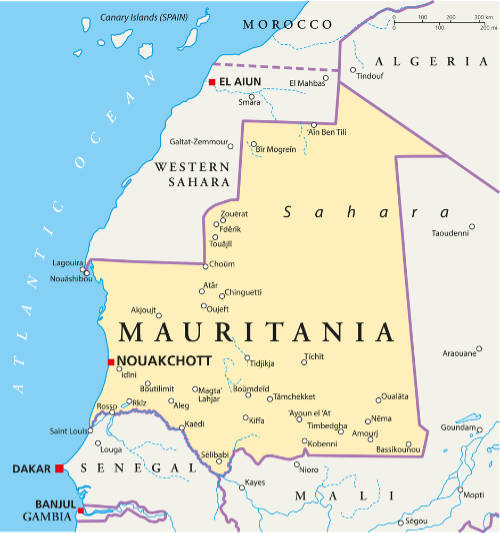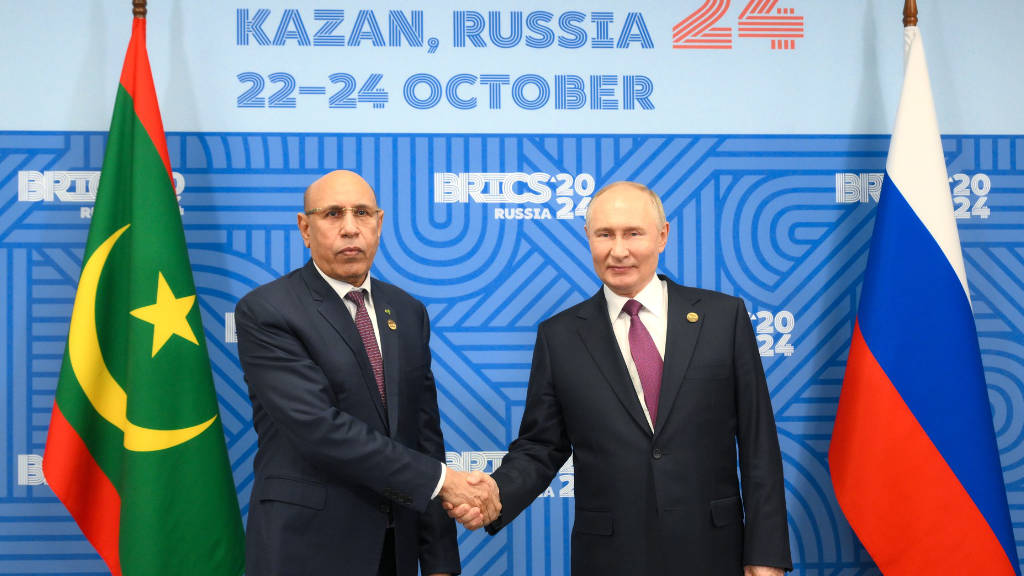Vladimir Putin has met with Mohamed Ould Cheikh El Ghazouani, the President of Mauritania, following the 2024 BRICS Summit in Kazan.
This is what they had to say:
Putin:
“Mr President, I am delighted to meet with you. We appreciate your decision to personally visit Kazan not only as head of state but also as chairperson of the African Union and to attend the BRICS Summit’s events.
The strengthening of cooperation with the dynamically developing African countries is one of BRICS priorities in the outreach format. Mauritania’s representatives took an active part in the group’s events organised during Russia’s chairmanship this year.
Russia has developed close and constructive relations with the African Union. We appreciate the practical activities of that organisation in politics and the economy, as well as in ensuring security on the African continent. We welcome the African Union’s decision to join the G20 as a full member. For our part, we are providing all-around assistance with this process.
Russia’s trade with Africa is growing with each passing year. It increased by over 30% in 2023 and continued to grow this year. From January to July, our mutual trade increased by another 25% year on year.
The two Russia-Africa summits, which were held with the direct and proactive assistance of the African Union, one in Sochi in 2019 and the other in St Petersburg in 2023, have given a fresh impetus to the further development of Russia’s relations with African countries. We are actively working together to implement the important documents adopted as a result of these events.
As for our bilateral relations, Russia and Mauritania developed close ties back in the middle of the 20th century, and we continue to strengthen them on the principles of friendship, mutual respect, and a balance of national interests.
This year, we will mark the 60th anniversary of our diplomatic relations. We have accumulated a wealth of positive experience in the area of mutually beneficial cooperation over that period.
We maintain regular political dialogue at various levels. Our foreign ministers keep in touch with each other. We are working consistently to strengthen the legal framework of our relationship. We have developed close ties in education. We have trained over 3,500 Mauritanian professionals. Mr President, we are delighted by the growing interest of your young people in studying in Russia.
Russia and Mauritania often take a common stance on the international stage, which helps us develop our relations on the same basis within the framework of the BRICS Plus/Outreach format.
We highly value your support for Russia’s initiatives at the UN and other multilateral forums and venues and are delighted that you attended the BRICS Summit. Thank you for coming to Kazan.”
El Ghazouani:
“Mr President, first of all, I would like to thank you and express our appreciation for inviting us to this summit and for the warm reception and hospitality accorded to us, to me personally and to our delegation upon our arrival in Russia. I would like to congratulate you on the success of the 16th BRICS Summit and to express my gratitude for this opportunity to exchange views in the expanded BRICS Plus format.
I had no hesitation in accepting your invitation, not only because it is an extremely important summit but also because I wanted to meet with you personally in order to openly discuss our bilateral relations and Russia’s relations with the African continent.
We in Mauritania believe that our relations with Russia, our historical and strategic relations are important to us, and we will spare no effort to strengthen and further develop them. In this connection, I would like to mention the historical ties of friendship that we share, which form the basis for the further development of our relations. As you rightly pointed out, our relations have been growing stronger over the past 60 years.
I highly appreciate the constant support you have provided to the development of our country since Mauritania gained independence, including by giving our young people an opportunity to study in various fields and disciplines at Russian universities.
We continue to develop our cooperation in priority spheres, in particular, fishing, higher education and trade. We highly appreciate it that our cooperation is based on trust, mutual respect and a balance of each other’s interests.
I would like to reaffirm my personal commitment to promoting cooperation with Russia. We would be delighted and would appreciate it if more Russian investors came to Mauritania, in particular, in fishing, agriculture, energy and natural resources, to make use of what we have to offer in these spheres in the interests of cooperation.
Our cooperation should be shaped within the framework of an intergovernmental commission, which will promote the strengthening and further development of our relationship in all spheres.”

Analysis & Implications
Mauritania is a North-Western African nation with an Atlantic Ocean coastline. It has been part of the “Great African Expedition”, a six-month long Russian exploratory voyage to assess fish stocks off the West African coastline.
Recent efforts by Moscow to build closer ties with Mauritania fits into Russia’s push for greater presence, both security and economy-wise, in the African continent. With Mauritania, however, Moscow also seeks augmented presence in the Sahel and West African region of the continent.
In early 2023, for the first time in the history of bilateral trade and economic relations, Sergey Lavrov, the Russian Foreign Minister, together with a delegation of Russian businessmen paid a visit to the capital of Mauritania, Nouakchott. The program, organized as part of the Russian Business Week in North Africa, included a Russian-Mauritanian business forum, a meeting of the Russian-Mauritanian working group on interaction at the business level, bilateral meetings on business interests, as well as visits to enterprises and organizations.
Russia is interested in investing in the following areas: fishing industry (production of fishmeal and canned food), where Russian fishing vessels have been operating in Mauritania’s exclusive economic zone for 30 years. However, the Russian Foreign Minister stated that “we need to direct our main efforts to diversify our trade and economic ties, to search for new forms of cooperation”.
The two countries can also work on the development of infrastructure, agriculture (including agricultural development, and the supply of Russian machinery and equipment), tourism, and energy and raw material exploration. Mauritania’s main industry is iron ore mining, and the country boasts gold, gypsum, and oil deposits where Russia can help with geological exploration.
For the moment Russian investments in Mauritania remain low. This is not so much because of Russian inactivity as much as foreign direct investments into the African country generally stand close to zero. A low level of security, a lack of proper bureaucratic systems related to foreign investors, and most of all, the uncertain geopolitical situation in the region overall. Yet Russia has to start somewhere, as Lavrov noted, and Mauritania has a potentially useful and strategic coastline and supplies of seafood that could make an impression upon Russian imports if managed and developed correctly. Russia may begin by helping install governmental and bureaucratic structures and help Mauritania develop from there.
Further Reading
Russia Looks To Africa For Seafood Supply Chains

 Русский
Русский













